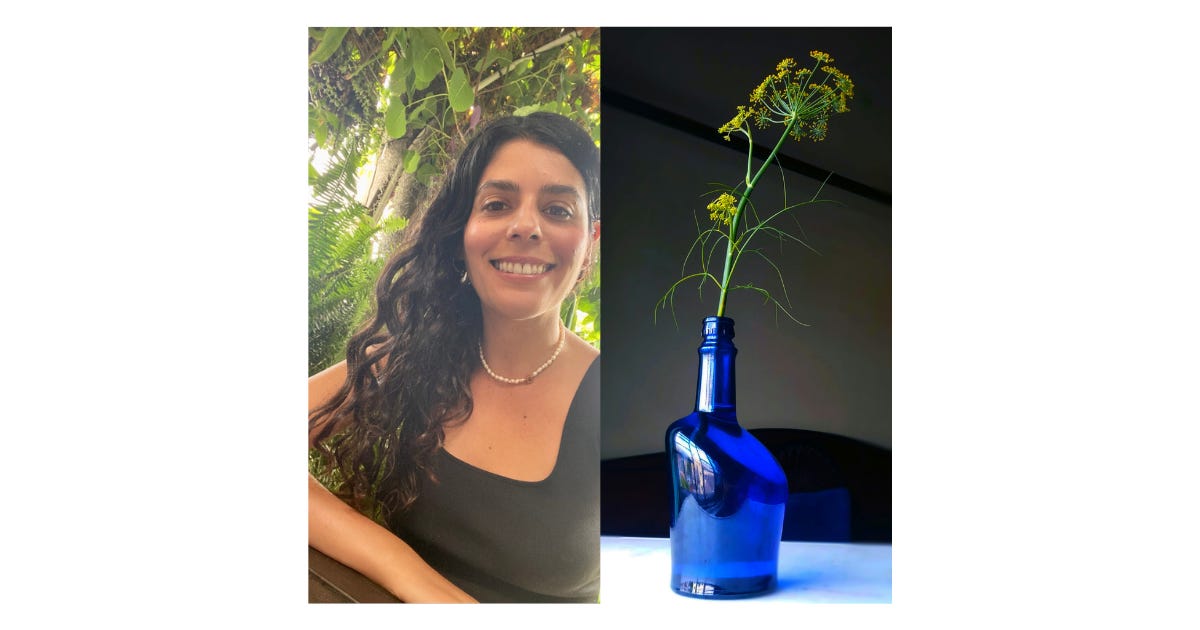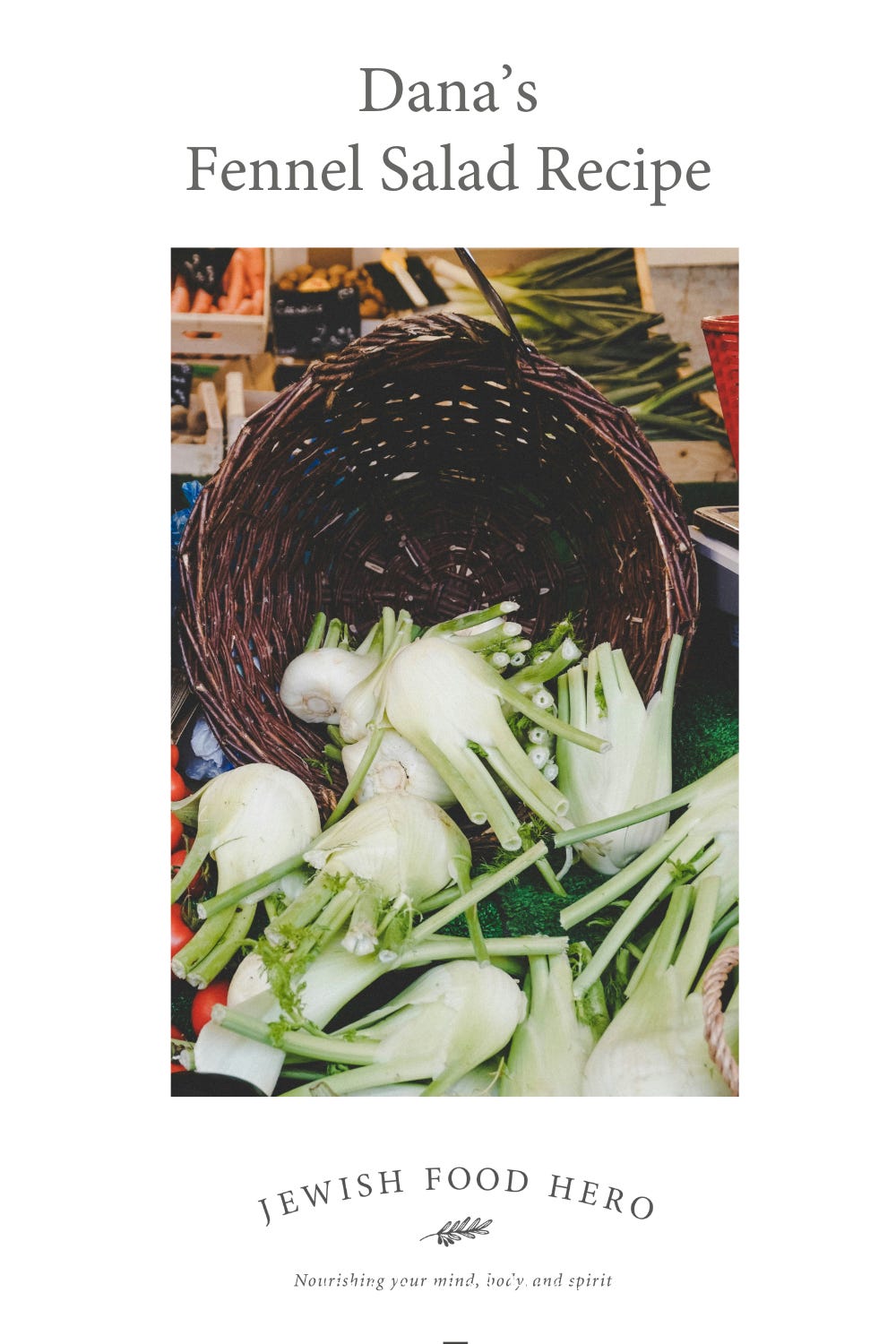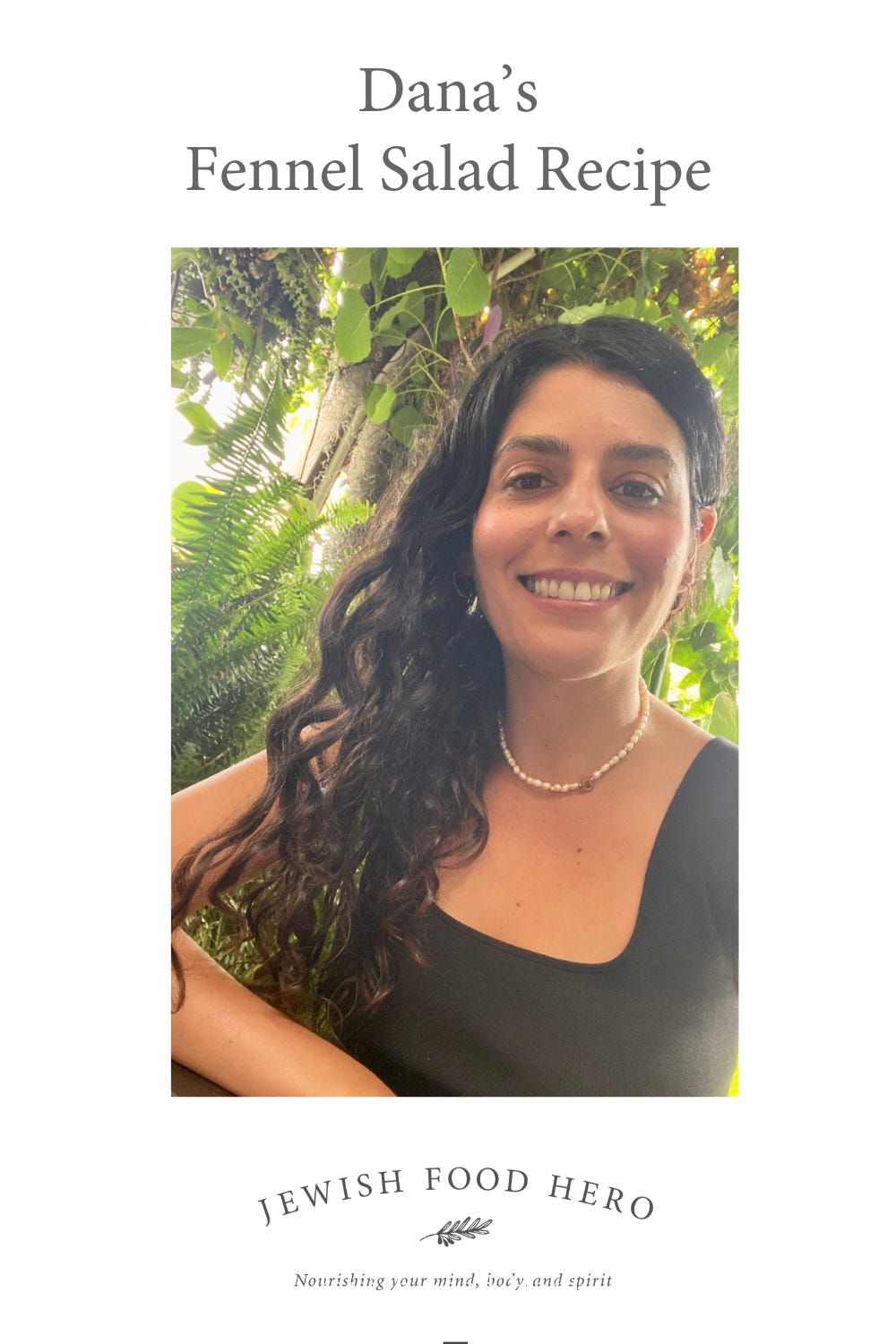Dana's Fennel Salad Recipe
+ Difficult Jewish conversations and the writings and talks of Einat Wilf
I hope this email finds you well amidst everything going on. Today, I wanted to share something simple —a recipe for a fennel salad. Sometimes, amidst the chaos, it's nice to return to the basics and find solace in simple food, you know?
This past week has felt emotional, confusing and heavy due to some tough discussions about Israel among my Jewish friends in the United States. It's been eye-opening, to say the least. There's this palpable tension between their Jewish identity and their social values. It's like their sense of self is being pulled in different directions, and it's tough to make sense of it all.
Lately, I've been immersing myself in the writings and talks of Einat Wilf, and her recent article encapsulates the palpable tensions many American Jews are grappling with. Her article The BDS Pound of Flesh: Using lies and social pressure to force students to disavow Israel is a strategy aimed at raising the psychic and professional cost of being Jewish delves into the complexities surrounding anti-Israel activism among young American Jews, reflecting on the pressures they face to conform to certain ideological standards. Wilf explores the historical roots of this dynamic, framing it as a modern manifestation of an ancient struggle for Jewish identity. Drawing from personal experiences and observations, the article highlights instances where Jewish individuals are coerced into renouncing their connection to Israel to gain acceptance in certain social or political circles. Ultimately, Wilf advocates for a steadfast embrace of Zionism as a means of resistance against such pressures, emphasizing the importance of maintaining pride in one's Jewish identity amidst external scrutiny and criticism.
I'm still processing everything, and I know you always have insightful perspectives. I'd love to hear your thoughts on this Jewish identity tension around Israel and Zionism . Your wisdom is always appreciated.
Now onto simple food comfort: fennel!
At the moment, I really love recipes that focus on just one main ingredient like the creamy butternut squash bake that I shared last week. This simplicity is so good for mental and physical health, and to help us train our palette and minds to rediscover whole foods. Oftentimes, we over-complicate food preparation.
Over-complicating food preparation can sometimes distract us from the inherent goodness of ingredients. While elaborate dishes can be enjoyable on occasion, there's something special about the simplicity and purity of meals that let the main ingredient shine.
By embracing simplicity in cooking, we can also cultivate mindfulness around eating. Instead of treating food solely as entertainment, we can approach it as nourishment for both body and soul. This shift in perspective can lead to a more fulfilling relationship with food and a greater appreciation for the ingredients themselves.
Embracing food simplicity can be a gift that we give to ourselves.
I eat fennel raw like an apple often (i’m serious!), so when I saw Dana post this fennel salad recipe it made me happy and reminded me to return to the basics. I asked her to share it with our community to showcase fennel and simple food.
There is a lot of social pressure to make food epic and complicated - everyday and even more so on Jewish holidays.
This recipe is an antidote to that - enjoy! Your body, mind and spirit will thank you.
Before we shift to Dana’s thoughts + recipe, let's get to know more about fennel, an underappreciated flowering plant.
Fennel, scientifically known as Foeniculum vulgare, is a flowering plant species in the carrot family (Apiaceae). Contrary to popular ideas, it is not a root vegetable - it's a flowering plant. It's native to the Mediterranean region but is widely cultivated and used in culinary practices around the world.
Appearance:
Fennel is a perennial herb with feathery leaves that resemble dill. It grows in stalks, similar to celery, and produces yellow flowers in umbrella-shaped clusters.Parts Used:
The entire fennel plant is edible, including the bulb, stalks, leaves, and seeds. Each part has a distinct flavor profile and culinary use.Flavor Profile:
Fennel has a sweet, licorice-like flavor, which becomes milder and sweeter when cooked. The seeds have a more intense flavor compared to the bulb or stalks.Culinary Uses:
Fennel is a versatile ingredient in cooking. The bulb can be sliced and added to salads, roasted as a side dish, or used in soups and stews. The stalks and leaves are often used as an herb or garnish. Fennel seeds are commonly used as a spice in various cuisines, imparting flavor to dishes like sausages, curries, bread, and desserts.Nutritional Benefits:
Fennel is low in calories but rich in nutrients. It contains fiber, vitamins (such as vitamin C, vitamin B6, and vitamin K), minerals (such as potassium, manganese, and calcium), and antioxidants. Fennel is also known for its potential health benefits, including aiding digestion, reducing inflammation, and promoting heart health.Medicinal Uses:
In traditional medicine, fennel has been used for various purposes, including relieving digestive issues like bloating, indigestion, and gas. It's also believed to have diuretic, expectorant, and antimicrobial properties.Cultural Significance:
Fennel has a long history of culinary and medicinal use dating back to ancient times. It has been prized for its aromatic and flavorful qualities in Mediterranean, Indian, Middle Eastern, and Chinese cuisines.Cultivation:
Fennel is relatively easy to grow and can thrive in various climates. It prefers well-drained soil and full sun. The plant can be grown from seeds or seedlings and requires regular watering and occasional fertilization.
Dana, can you tell us a bit about yourself, your background and your journey into creating healthy recipes for women?
My name is Dana, I moved from Israel to the US around 7 years ago.
I started exploring plant based eating and wanted to create my own recipes. I love creating recipes that benefit everyone. Healthy eating is my passion and I want to make it easy and accessible to everyone. I share my recipes and thoughts on instagram here
I think that food has become a source of comfort to a lot of people, which is lovely. At the same time, we also need to learn what the best options for our bodies are.
Being alive and moving our bodies is a gift, so eating healthy is a way for us to appreciate this gift.
Food and health philosophy:
How do you approach the relationship between food and health in your life, and what guiding principles do you follow when developing your recipes?
I eat mostly plants, whole grains and natural sugars. I don’t believe in eating overly processed foods. There is a view that junk food is food for the neshama, but I disagree. The most important thing is to eat foods that keep us alive inside.
Nutrition is important, but what’s more important is how we treat ourselves and how we talk to ourselves.
Jewish identity and judaica:
Could you share how you express your Jewish identity in your daily life and within your home, particularly through food and any Judaica items or traditions that are significant to you?
Every day when I wake up I read a few blessings: the first one is modeh ani for waking up and being back in my physical body.
I grew up in Israel and both of my parents immigrated from Morocco, so when I was young our house was always filled with the smells and flavors of my mom’s Moroccan cooking. As an adult, I cook for Shabbat, even if I'm tired. Shabbat is a big part of my life and I’m so grateful that Hashem gave us this gift.
Kitchen staples:
What are the three foods or ingredients that you always make sure to have in your kitchen, and how do you incorporate them into your daily meals and recipes?
Date syrup, gluten free bread, and chickpeas.
Date syrup is my sugar substitute, and I add it to pasta sauce, cookies, and any baking products.
Gluten free bread is always in my fridge. I make avocado toast with it and different sandwiches. (here is gluten free sliced Challah bread)
Chickpeas are a great source of protein and fiber, and to use in making different curries.
Could you share the story behind your Fennel Salad Recipe and what makes it special to you?
Every Friday my mom would make different salads, but the fennel salad was always the favorite for me and my younger sister. We loved to snack on it before shabbat dinner started (which my Mom was not happy about, haha!), and would eat more of it during the meal.
Dana’s Fennel Salad Recipe
You can adapt all of the ingredient quantities according to your taste and how many you are catering for.
Ingredients
1 fennel (or more, if you like!)
Olive oil
Lemon juice
Sea salt
Black pepper
Instructions
Cut the fennel really thin.
Add the rest of the ingredients and mix with your hands.
Tip: You can serve the salad immediately, but the more you let this sit the tastier it gets. Fennel browns quickly after being cut, so make sure you dress it immediately because the lemon juice will stop it from browning.
Another tip: I (Kenden) make this recipe this morning and used walnut oil instead of olive oil and it tastes delicious!
Share your favorite one ingredient recipes
I hope you love Dana’s Fennel Salad Recipe as much as I do, and that it inspires you to take the pressure off and enjoy simple food too.
Do you have recipe that you’d love to share with our community? Please write to me to share it: hello@jewishfoodhero.com
Am Yisrael Chai
Kenden
P.S. If you are interested in Einat Wilf’s work here is a list of her books











